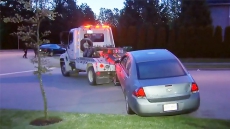TORONTO — Police officers across Canada have been getting paid for years to stand around manholes and construction sites during off-hours.
But no one seems to know just when the practice first started, or where — not even those who reap millions of dollars every year from so-called "paid duty," a program that allows companies and individuals to hire off-duty officers for various events.
"When we tried to pin down where these requirements came from, nobody could tell us," says Alok Mukherjee, chair of the Toronto Police Services Board, which oversees the force.
From a thick binder labelled "Paid Duty," he pulls a copy of a document from 1957 — minutes from a police board meeting that references setting the rate for paid duty.
As far back as the 1920s, Toronto's then-police chief criticized paid duty, saying it would likely be rescinded.
But today, the practice has become a funding source for cash-strapped police forces, and a lightning rod for criticism.
In cities that include Montreal, Waterloo, Ont., and Calgary, critics are raising concerns that the system grants better protection to those with the means to pay for it, and questioning whether officers can remain impartial towards those who offer lucrative contracts.
In Toronto, where the program has been a political hot potato for decades, city officials are eager to cut back the funds doled out each year for paid duty supervision of municipal projects.
Mukherjee also worries about what he calls the "reputational" cost.
"When people talk about police officers these days, it is interesting how frequently they talk about the police officer who is standing guard over a sewage drain doing nothing, slouching, holding a cup of coffee," he said.
Base salaries of police constables in Toronto range from $63,436 to $90,623, the force's website shows. Meanwhile, paid-duty earnings amount to an average of $8,909 per officer, according to Ontario's so-called sunshine list.
Mukherjee wants to overhaul the program, including eliminating what he calls "rent-a-cops," where officers are hired for events that aren't required by law to have a police presence, such as Maple Leafs and Blue Jays games.
He also wants the city and the province to change rules that mandate when an officer must be on scene, usually to guide traffic, on larger roads that are under construction.
"I'd rather see a combination of special constables, paid duty and private security," he said.
In 2014, Toronto police officers made more than $27 million for performing paid duties, with the service raking in another $4 million from a 15-per-cent "administration fee" and another $1 million for equipment.
More than 80 per cent of that cost is paid for by private individuals or organizations, which is why the head of the police union said the debate is not about finances since it doesn't affect the police budget.
"There's no economic basis to attack paid duties, so they've shifted to the reputational impact, which, to me, holds no water at all," Mike McCormack said.
"When we have officers who are downtown or in the city to improve traffic flow, it actually increases our reputation."
Mukherjee doesn't think so. The police board has the power to set guidelines on paid duty, he said, but change will have to come from the incoming police chief, Mark Saunders.
A spokesman for Saunders said paid duty is among the issues the new chief will tackle once he's sworn in, but would not elaborate further.
A recent report by the Association of Municipalities of Ontario recommended that some of the specific functions of paid-duty officers should be transferred to civilians or other security providers.
"This could include court security and prisoner transportation, data entry, accident reporting, burglary investigations (provided the burglary is no longer in progress), and forensics, among other functions," the report states.
In Montreal, the paid-duty system — established in the mid-1990s — is seen by some as a way to bolster municipal coffers. At one point, there was a push to use the program to help transform the force into a self-financing entity.
A report issued last year by Montreal's public safety commission urged the force to look at ways to expand its paid-duty services in order to generate more revenue.
The current police chief, Marc Parent, made it clear when he took over five years ago that he planned to scale back the program after the city's then-mayor raised concerns about the appearance of two-tier policing.
Guy Ryan, a former Montreal police inspector, said he always had reservations about the system, particularly with paid-duty assignments he considered too close to security work.
"I'd say: 'Come on, there's an ethical issue there for us as a public service,' but there were some who went around that because they said it was additional revenue," he said.
The man overseeing Montreal's paid duty program — called "commercialization" — said strict guidelines have been put in place in recent years to ensure the force's integrity isn't compromised.
Officers aren't allowed to take on work that amounts to acting as a security guard, or that could give the impression of a conflict of interest, said Didier Deramond, the force's deputy chief. That includes watching over bars or other businesses, he said.
Paid duty brought in roughly $4.4 million last year, Deramond said. While it does count as revenue in the police budget, he said it isn't a cash cow for the force. "We charge them what it costs us — we're not making any gains with this," he said.
A few years ago, ethical concerns prompted Waterloo's then-police chief to step in after business owners in the city's bar area started hiring paid-duty police officers to patrol on weekend nights.
Matt Torigian, now deputy minister of Ontario's Community Safety and Correctional Services, told the Waterloo Record at the time he believed policing should be shared equally instead of allowing one area to pay for "a higher level" of service.
In Calgary, police stopped offering paid-duty services to bars eight years ago after community groups said they were worried the officers would act in favour of their paying clients rather than remain impartial in the event of disputes.
There's a different model in Vancouver. Off-duty officers can still pick up paid shifts to guard Vancouver Canucks hockey games or other large events, but cops do not handle traffic at construction sites. Instead, civilians known as special constables are used to help guide traffic.
The cost is significantly cheaper.
"It would be very rare to have a police officer at a construction site — we have a traffic authority if we need someone other than the flag person," said Vancouver police spokesman Const. Brian Montague.
"Basically, this is an on-call position, on a part-time basis. These are teachers, veterinarians, people who want to help out, but this is not a full-time job."
In 2011, Toronto's auditor general recommended the Vancouver model.
A year later, Toronto's former chief, Bill Blair, reported back to the board, saying if the Vancouver model were to be implemented, the force stood to lose $16 million in revenue. Blair also suggested the move could have a negative impact on the morale of the force.





